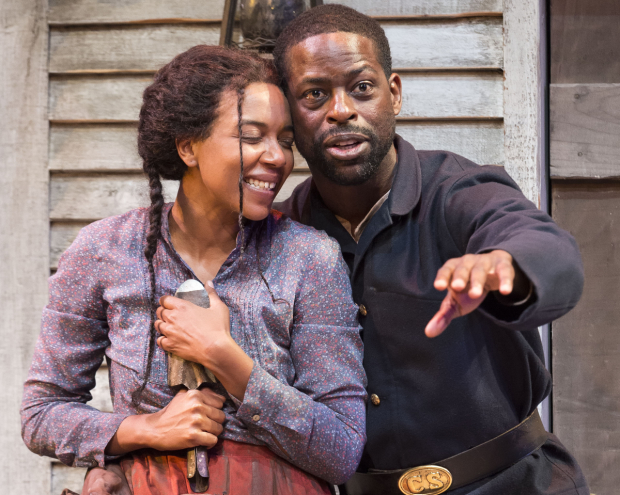Father Comes Home From the Wars (Parts 1, 2 & 3)
Suzan-Lori Parks’ three-act play waxes Homeric at the Mark Taper Forum.

(© Craig Schwartz)
Perhaps the notion of being inspired by a much-recounted epic felt too confining or maybe all this protesting is simply a dodge. Nobody can disprove Suzan Lori-Parks' oft-made claim that the inspiration for her play Father Comes Home From the Wars is her late father, career soldier Donald Parks, and not Homer's Odyssey. Then again, when you've written three parts, promise six more and name your characters Homer, Penny, and Odyssey Dog, people might be dubious.
What's most important about a work as monumental, daring, and engaging as Park's, however, is that it even exists in the modern world. Thus, Jo Bonney's exciting restaging of this Public Theater/American Repertory Theater production at the Mark Taper Forum is a gift.
From its opening beats, in which a group of "less than desirable slaves" wager over the fateful decision of a would-be soldier, to the reappearance of that soldier's lost dog nearly three hours (and two plays) later, Bonney's production grabs its audience and refuses to set it free. Parks is reconsidering the Civil War and military service in general from the perspective of an African-American slave. Not only are the wartime trials faced by Hero (Sterling K. Brown) relevant, Parks' plan to track Hero's descendants in parts 4-9 will connect the saga to present-day conflicts. The contemporary canon needs those future plays, and we need Parks to write them.
In part 1, A Measure of a Man, Hero's decision to follow his master into war is tracked by a raft of characters, each of whom pulls him in a different direction. His fellow slaves are evenly split based on how much they've wagered. The crippled slave Homer (Larry Powell), whom Hero betrayed, would like Hero gone, thereby opening up his prospects with Hero's wife, Penny (Sameerah Luqmaan-Harris). The unnamed Old Man (Roger Robinson), who has been Hero's surrogate father, hopes Hero will achieve glory on the battlefield. Penny wants her husband by her side.
Hero is torn. If he serves, he has been promised his freedom by the owner who says he values his worth, and who has a history of broken promises. "I got a chance at getting something," says Hero, whose decision will have reverberations among the master's other slaves.
Part 2, set later that summer, finds Hero in the Southern wilderness, attending his master the Colonel's every task, including looking after Smith (Josh Wingate), the Union officer from the 1st Kansas Colored infantry who has been captured. Sharply dressed in gray, Hero carries supplies instead of arms, and the interplay between Hero and his master-turned-Colonel is charged and shot through with layers of complexity.
The Colonel is a tour-de-force role for the always interesting Michael McKean, who is either playing an outright bastard or a closet hero himself. The shifting danger and uncertainty of McKean's performance guarantees that we'll miss him when he's gone.
Parks expertly carries themes and conceits throughout the saga. The Colonel and the captured Captain Smith discuss Hero's "worth" in financial terms based on his skills, his conduct, and his purchase price. Hero, Penny, and all of the slaves may use the term "freedom" liberally, but Father Comes Home From the Wars essentially represents Hero's quest to find out what the word freedom even means.
Part 3, The Union of My Confederate Parts, picks up the action from part 1 back at the Texas plantation. We find Homer and Penny carving out a life for themselves, post-Hero. Parks introduces a new group of slaves, runaways who are headed to freedom and want Homer and Penny to join them. The arrival of the dog Odyssey (pronounced "Odd-see" because of his eyes) is a harbinger of another return. Patrena Murray's earnest performance as Odyssey is a pillar of emblematic fidelity (and a wise one at that), but her presence causes the writing to jump the rails a bit here.
Repeating his performance from the Public, Brown gives us a Hero who is as proud as he is flawed. It's no given that heroes are the most interesting characters in the sagas around them, but Brown adds new layers and shadings from act to act. Robinson and Luqmaan-Harris are excellent as well, while guitarist and music director Steven Bargonetti provides enhancing choral-like musical accompaniment.
As strong as this ensemble is, the shining light of the Father Comes Home cycle is Parks' writing, which is as funny as it is penetrating. The author who won a Pulitzer Prize for Topdog/Underdog, and once pulled off the feat of writing a play a day for a year, knows her way around the first segment of an epic. She's got six parts to go, and if the first segments are any indication, more laurels are in her future. As one of her wagering slaves would say, "mark it."






![0928 Cleveland MatteoLane 2024 1200x1200[98] copy](https://www.theatermania.com/wp-content/uploads/sites/4/2024/10/0928_Cleveland_MatteoLane_2024_1200x120098-copy.jpeg?w=300)



